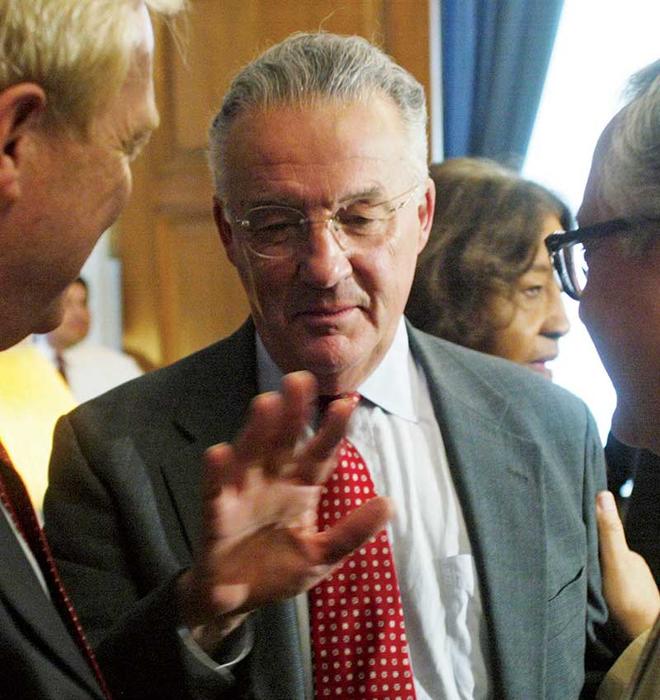
Feb. 3, 1933 – Dec. 6, 2020
Paul S. Sarbanes ’54 spent 30 years in the Senate at a time when the words “quietly effective” were still a reality in Washington, but even then he was a rarity: a politician who had no need for the spotlight. The principal photograph that accompanied his New York Times obituary seemed apt. It pictured him at the fringe of the frame, not the center.
Yet Sarbanes was in the thick of things when it mattered. As a second-term congressman at the height of Watergate, he drew the assignment of presenting the House Judiciary Committee’s first article of impeachment against Richard Nixon. As a senior statesman in 2002, he co-sponsored the landmark law that reined in the phony accounting practices that had sparked corporate bankruptcies and massive investor losses.
In the decades between, the Maryland Democrat represented his constituents with close attention and a minimum of fuss, commuting back and forth between Capitol Hill and his family’s home in Baltimore each day, often stopping along the way at community celebrations and events. “I think that kept him very grounded,” says his son John ’84, who now holds his father’s old House seat.
Sarbanes grew up in Salisbury on Maryland’s Eastern Shore, the son of Greek immigrants who ran a restaurant and lived above it. He was a standout student-athlete at his public high school, and after a Princeton recruiter came calling in an effort to diversify the University’s prep-school admissions pipeline, Sarbanes, whose nickname was Tyke, won a full scholarship. As a senior, he won the Pyne Prize (as did his younger son, Michael ’86) and went on to earn a second bachelor’s degree as a Rhodes Scholar at Oxford, then a law degree from Harvard.
Princeton “meant everything to him,” John Sarbanes says. “He often said that Princeton opened up the wider world.” On his first trip to campus, Sarbanes’ father, Spyros, baked a ham for President Harold Dodds *1914, who invited him to discuss Greek philosophers over tea. When Sarbanes won the University’s Woodrow Wilson Award in 2007, he expressed gratitude for Dodds’ “enormous courtesy,” saying it “reflects Princeton.”
Dan Rodricks, a longtime columnist for The Baltimore Sun, wrote after Sarbanes’s death that while conservatives sometimes mocked him as a “stealth senator” for his low profile, “it always seemed to me that Sarbanes was thoughtful, deliberative and serious about his work. His intellect was intimidating, especially when it came to ... almost everything.”
When the Senate’s Democratic leaders needed a cool head and a calm voice to grapple with tough issues — from ratification of the Panama Canal treaties to the impeachment trial of Bill Clinton — they often turned to Sarbanes.
“He never flaunted his talents, his knowledge, the people he knew, the things that he did,” says his classmate David Rosenberg, a retired pediatrician, who met Sarbanes on their first day of school at Princeton in 1950, became his roommate for their last three years, served as best man at his wedding, and remained close all these seven decades. “He was just a beautiful guy.”
Todd S. Purdum ’82 is a veteran journalist and the author of Something Wonderful: Rodgers and Hammerstein’s Broadway Revolution.
Watch Rep. John Sarbanes deliver remarks in memory of his father:






No responses yet